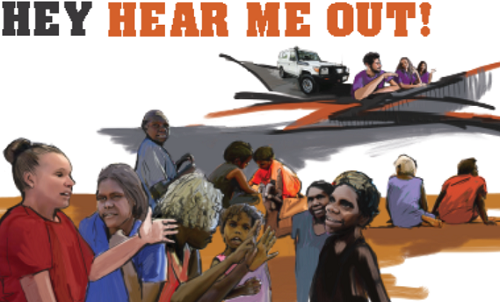A new report aims to understand what helps, and what makes it hard for First Nations NDIS participants who are Deaf or Hard of Hearing, to use their National Disability Insurance plans in a way that meets their needs and aspirations.
Using participants’ own language and modes of communication, Jody Barney, a Deaf Birri-Gubba and Urangan woman yarned with First Nations NDIS participants living in rural and remote communities in the Northern Territory to prepare this report, ‘Hey! Hear me out. Voices of Deaf and Hard of Hearing Mob on the National Disability Insurance Scheme in the Northern Territory.’
All participants identified the need for a cultural, local language and/or sign interpreter to support NDIS planning and use. Many experienced challenging life circumstances such as family separation, insecure housing and interaction with the justice system.
What helped people use their plans.
Participants were more enabled to engage in the planning process and use their plan to achieve desired outcomes when they were provided with enough relevant cultural and communication supports. They also benefitted when skilled NDIS staff and service providers supported individual communication needs, and used culturally safe ‘proper way’ behaviours to engage with families, cultural guardians and advocates.
What made it hard for people to use their plans.
The persistent discrimination and disadvantage associated with colonisation, and ongoing challenges in access to culturally safe services and support, impact the ability for Deaf or Hard of Hearing mob in the NT to engage with and benefit from the NDIS.
Key challenges experienced by participants included:
- intergenerational trauma
- complex life circumstances where disadvantage and discrimination in one part of life e.g. education, often led to challenges in other areas of life such as health or interactions with the criminal justice system
- limited timely access to culturally safe supports to respond to the challenges of early childhood onset of hearing loss
- a mistrust of ‘white fella’ systems, compounded by limited NDIS recognition and understanding of Deaf mob circumstances and needs
- insufficient cultural and communication supports to understand the NDIS and to advocate for plans that met individual needs and aspirations
- limited availability of culturally safe and communication responsive services and supports, particularly on Country
- having to move off Country, away from family and culturally aligned supports, was commonly extremely distressing
- challenges across and within ‘white fella’ systems impacting Deaf mob ability to live better lives, connected to Country, family, culture and community
- when services e.g., Specialist Disability Accommodation and/or Supported Independent Living, were culturally unsafe and communication unresponsive, misunderstanding placed participants at risk of harmful practices, re-traumatising them and their families.
Challenges experienced by First Nations people who are Hard of Hearing are often different to the challenges experienced by people who are Deaf.
Despite the high prevalence of hearing loss across many communities, people are often unaware that they experience hearing loss.
For those that are Deaf and communicate using sign, people they engage with generally understand they communicate differently. When people are Hard of Hearing, other people often don’t know that they have to do something different than they usually do to communicate with them.
Increasing awareness that so many mob are Hard of Hearing is the first step for improving outcomes for this group. It is then important for families, communities and service providers to learn what they can do to improve communication with people with hearing loss.
Download Hey! Hear me out – Voices of Deaf and Hard of Hearing Mob on the NDIS in the NT
Contact the authors
- Jody Barney, Deaf Indigenous Community Consultancy, jody@deaficc.com.au
- Damien Howard, Phoenix Consulting, damienatphoenix@gmail.com
- Alexandra Devine, The University of Melbourne, alexandra.devine@unimelb.edu.au

